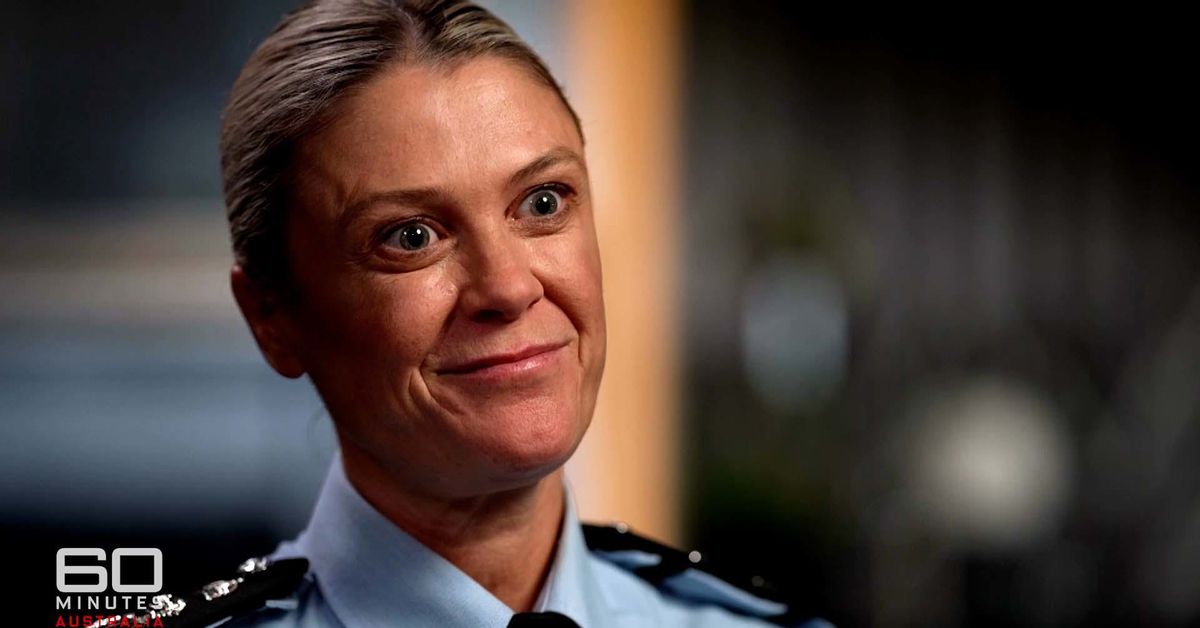By any measure, Krissy Barrett’s rise through the ranks of the Australian Federal Police is impressive.
Just over a week ago, she became the commissioner; the first woman in the AFP’s 46-year history to hold the position.
Of course, gender is not the reason she got the job. Commissioner Barrett is a skilled police operator who fully understands the challenges and responsibility she has to keep Australians safe.
 Krissy Barrett’s career with the AFP began when she was just 21 years old. (Nine)
Krissy Barrett’s career with the AFP began when she was just 21 years old. (Nine)
“There’s a lot of particularly young women who are inspired by my career journey and now me as the female Commissioner,” Barrett told Nine’s Tracy Grimshaw.
“What has been so amazing is how much support I’ve had from men and women all over the country – actually, all over the world.”
An eventful internship
Barrett’s journey with the AFP began when she was just 21 years old, with an internship in the organisation.
“We were definitely not stuck in the office,” she told 60 Minutes.
“I think back, actually, to some of the activities that we were involved in as interns. Certainly wouldn’t be able to do it these days.”
 “I had the most amazing 12 weeks,” Barrett told 60 Minutes about her internship. (Nine)
“I had the most amazing 12 weeks,” Barrett told 60 Minutes about her internship. (Nine)
As an intern, a young Barrett had the opportunity to go out on search warrants, shoot firearms at the range and take part in operational strategies out on the field. It was, she said, a “warts and all” look inside the AFP and Barrett was hooked.
“My first job was actually making sure that the stationery cupboard was full,” Barrett said.
“I then had [the] fantastic opportunity to go over and work in the Solomon Islands as an unsworn intelligence officer over there, which was incredible.
“I came back and had 10 fantastic years working in ACT policing in Canberra, frontline uniform policing, which taught me so much about working with community.”
The challenges of modern policing
What followed was a rapid ascent through the ranks of the federal police.
Barrett has worked in financial crime, organised crime, counter-terrorism, espionage and foreign interference.
Barrett told 60 Minutes her overarching motivation is to keep Australians safe – a task she says becomes more difficult with each passing year.
The isolation of COVID lockdowns, Russia’s invasion of Ukraine and war in the Middle East have all fed a global fracturing that’s being felt in our suburbs.
 Barrett was sworn in this month. (Nine)
Barrett was sworn in this month. (Nine)
“Our caseload has changed in terms of what is motivating people to move towards violent extremism or terrorism,” she said.
“I think just the thought of anyone living in our country or living in our community not feeling safe, not feeling valued in this country, we should all be concerned about that.
“As a consequence, we’ve created new teams, national security investigations teams to focus on the really critical role that we play around social cohesion.”
An issue close to home
Barrett is not just a police officer – she’s also a mother. That, she told 60 Minutes, makes it all the more difficult to see the radicalisation of young people on the rise.
“As a police officer, but also as a parent, it is confronting to acknowledge that a young person actually has the intent and the capability to carry out an act of violent extremism and or terrorism,” she said.
It’s an important discussion she’s been forced to have with her 11-year-old son.
 A 16-year-old was charged with terrorism offences over the alleged stabbing of a bishop in Sydney last year. (Nine)
A 16-year-old was charged with terrorism offences over the alleged stabbing of a bishop in Sydney last year. (Nine)
“Like most preteen boys, you know, [he] does spend time on gaming platforms,” she said.
“I’s a confronting conversation to have with your child because, you know, they are still quite naive at that age, and they do still see the positivity in the world.
“But this, this is the world that we live in and these are the conversations that we need to be having.”
Foreign interference
In late August, Prime Minister Anthony Albanese revealed the Australian government believed the Iranian government was behind at least two antisemitic attacks on Australian soil.
Iran’s ambassador to Australia was sensationally expelled, amid revelations the Iranians had used notorious gangster, Kazem Hamad to orchestrate the attacks.
Hamad was deported from Australia to Iraq in 2023, and is widely believed to be the mastermind behind the tobacco wars exploding around the country.
The overlap between organised crime and state actors is just one example of how foreign regimes continue to threaten us.
“There are state actors that are looking to take advantage of what I would describe as a volatile environment here in Australia,” Barrett told 60 Minutes.
“It is so important that we are targeting and that we are taking action and disrupting this activity as early as we can because we know the impact that it can have, not just on, sectors of particular communities within Australia, but the Australian community more broadly, our way of life.”
Keeping Australians safe is by no means an easy task, but it’s one Barrett says she’s ready for.
“It’s fundamental to the way that we live our lives in this country, and we should be protecting that with everything that we have,” she said.
“That is what the AFP is here to do, to deliver for the community that we serve.”
Watch the full episode of 60 Minutes on 9Now.

